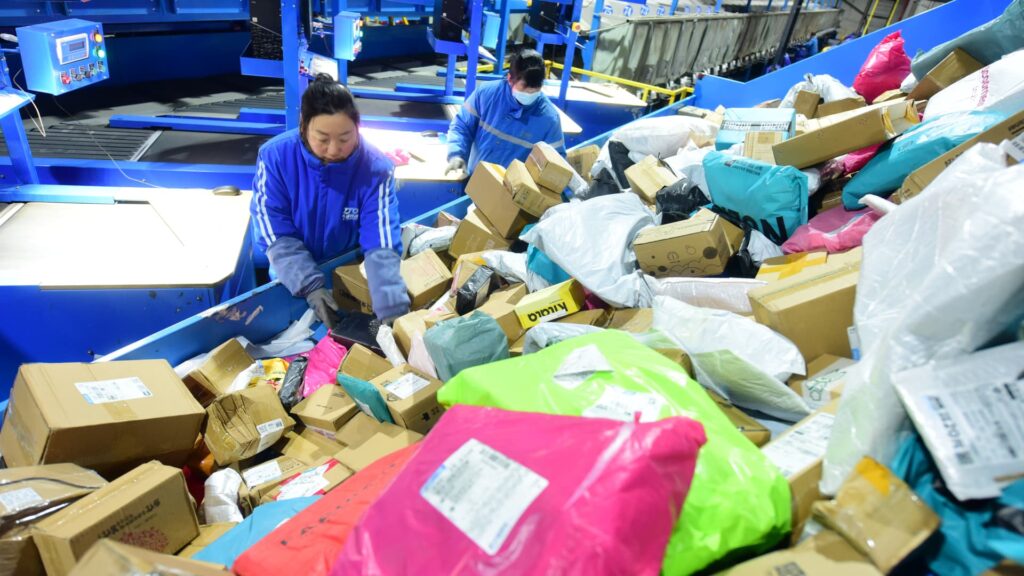Online shopping is widely expected to expand in China. It's not clear how much established companies like Alibaba and JD.com will benefit. “You're going to see relatively strong new players coming in,” James Yang, a Hong Kong-based partner at Bain & Company, told me last week. “It's not just a two-player game, it's going to be a three-, four-, five-player game,” he said. According to Bain, e-commerce will account for 37.5% of China's retail sales in 2023, up from 27.9% in 2019. Data shows that China is by far the number one e-commerce penetration in Asia. In the United States, official data shows that e-commerce penetration as a percentage of retail sales is just below its pandemic-era high of 16.4%.To bolster Alibaba's credibility, the e-commerce giant's co-founder Joe Tsai told CNBC's Emily Tang earlier this year that online shopping will reach 40% of China's retail sales in the next five years, and after a restructuring last year, the company is poised to seize the opportunity. Yang echoed Tsai's prediction about rising e-commerce penetration. “A lot of people I've spoken to in the industry speculate that it's 50-50 at some point, because at the end of the day there's a role for brick-and-mortar stores,” Yang said. “Who's going to enjoy that growth?” Yang said. “The growth equation and incremental growth is different than it was before.”Tem's parent company PDD Holdings recently overtook Alibaba again in market capitalization. Goldman Sachs analysts upgraded PDD's rating to buy from neutral on May 24, just two months after the company's March downgrade. “We believe China e-commerce has emerged as one of the most undervalued subsectors of the Chinese internet industry (relative to industry GMV growth in the high single digits),” Goldman Sachs analysts Ronald Keung and David Ma said in a note. GMV (gross merchandise value) measures total sales over a period of time. Goldman analysts pointed to ad tech upgrades that will boost advertising revenue, strong free cash flow generation and global expansion that has yet to be reflected in the price. They raised Temu's valuation to $19 billion from $18 billion, based on a model that excludes the company's U.S. operations due for geopolitical concerns. The analysts also raised their price target for PDD to $184 a share from $145, about 21% higher than Thursday's closing price for U.S.-listed PDD. Chinese e-commerce companies will receive a near-term report card in the coming weeks based on the 618 Shopping Festival, which is scheduled to end in mid-June. “The company's sales base is high and competition is strong, driving sales growth of 6.18% in the second quarter of 2024. JD maintained its full-year outlook, but more evidence is needed to prove that its business has turned around,” Morgan Stanley equity analyst Eddie Wang and team wrote in a May 17 report. The firm has an equal price rating on JD.com and a price target of $28, below the stock's Thursday closing price of $30.21. UBS analysts still believe JD.com's stock price can rise to $40. In a May 28 report, they recommended buying the stock. “On a clean base, following JD's business optimization, general merchandise, and especially the supermarket division, should be the main drivers in 2024,” UBS analyst Kenneth Fong and team wrote. JD has yet to make significant inroads into e-commerce overseas, while Alibaba has been increasing spending on its international operations.Last week, its cross-border e-commerce platform AliExpress announced it had signed David Beckham as its largest global brand ambassador partnership to date. “We expect Alibaba shares to remain range-bound over the next three to six months as its financials still face uncertainty at this early stage of the investment cycle,” J.P. Morgan China Internet analyst Alex Yao said in a May 15 report. He rates Alibaba shares overweight with a price target of $100, nearly 26% higher than Thursday's closing price. “Improved domestic e-commerce market share should ultimately translate into improved monetization,” Yao said. “Taobao/Tmall GMV grew double digits year-over-year in the March quarter, suggesting a very modest market share decline compared to the 11.6% growth in national online physical goods GMV in the quarter.” But the company that actually ate up market share is privately held. TikTok's parent company Bytedance runs a similar version of the app in China, Douyin, which serves as a sales portal for brands and influencers, mainly through livestreaming. Douyin is expected to reach 19% of gross merchandise market share in China this year, surpassing the individual shares of JD.com, Alibaba's Taobao or Tmall, according to Goldman Sachs analysis. The investment firm expects Douyin to match PDD's market share of 21% next year and surpass it by reaching 22% in 2026. Tencent's WeChat video account platform is expected to maintain a gross merchandise market share of around 2% to 3% through 2026, according to Goldman's analysis. Another e-commerce player that is growing is Hong Kong-listed Kuaishou. The video streaming platform said last month that its first-quarter e-commerce gross merchandise volume rose 28.2% year-on-year to 288.1 billion yuan ($40.55 billion). “We remain positive,” Kuaishou said. [Kuaishou’s] “We forecast total revenue to grow 9.5% year-over-year in the second quarter of 2024 as the company focuses on advertising and e-commerce monetization and profit growth,” CMB International analyst Sophie Huang said in a May 23 note. The firm expects Kuaishou e-commerce GMV revenue to grow 25% this year, but livestreaming revenue, which accounts for about a third of total revenue, is expected to decline due to a higher base. CMB International has a price target of HK$97 ($12.41) for Kuaishou shares, about 70% above Friday's levels. — CNBC's Michael Bloom contributed to this report.


